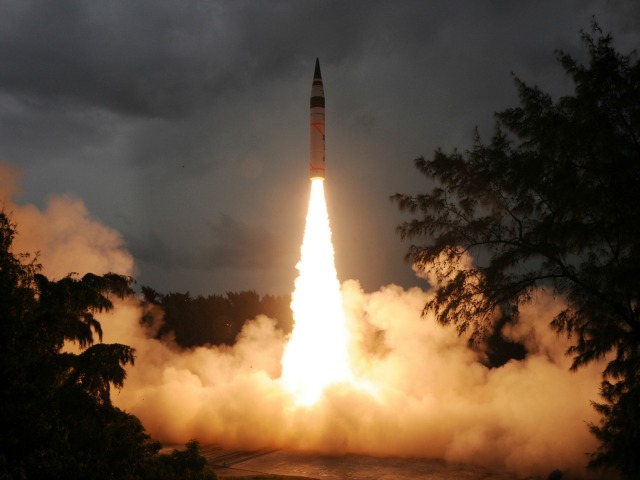
This morning’s key headlines from GenerationalDynamics.com
- Narendra Modi may change India’s ‘no first use’ nuclear policy
- Taiwan’s proposed trade deal opens old wounds with China
Narendra Modi may change India’s ‘no first use’ nuclear policy
India’s Bharatiya Janata Party (BJP) is widely expected to win India’sparliamentary elections, the first round of which began on Monday.India is the largest democracy in the world, and so national electionsare helpd in separate regions over a five-week period.
Self-described Hindutva (Hindu nationalist) Narendra Modi is the headof BJP, and he’s promising a substantially more aggressive foreignpolicy for India, including a promise to get tougher in territorialdisputes with China. He’s the “hope and change” candidate for thiselection, and he’s expected to become the next prime minister.
Modi is also promising to review India’s “no first use” policy fornuclear weapons. The no first use policy was adopted with referenceto India’s arch-enemy Pakistan, and the previous administration haspromised that it will not be the first to use nuclear weapons in awar. However, Pakistan does NOT have a no first use policy, soModi is promising to review India’s.
India’s last generational crisis war was the war between Hindus andMuslims that followed the partitioning of the Indian subcontinent andthe creation of the states of Pakistan and India in 1947. This actionprecipitated among the worst and bloodiest wars of the 20th century, asHindus from the new Pakistan state migrated to the India side of thepartition and Muslims from the India side migrated to Pakistan,butchering and slaughtering each other along the way.
India’s current prime minister is Manmohan Singh, born in 1932.Although he’s a Sikh, he and his family witnessed the massiveslaughter of the Partition War, as his family migrated from Pakistanto India at the time. Like many people who survive a generationalcrisis war, Singh has devoted his life to making sure that nothinglike that ever happens again, and he’s been remarkably conciliatorytowards Pakistan and China since he became prime minister in 2004.
If Narendra Modi, born in 1950 after the Partition War, becomes primeminister, it will mark a significant generational change. Modi’sHindu nationalism is already strongly asserting itself, andit’s made him very popular. If he wins, we can expect tosee relations with China and Pakistan become considerably moreconfrontational.Times of India
Taiwan’s proposed trade deal opens old wounds with China
A boisterous protest by hundreds of students blocking the parliamentbuilding in Taipei, the capital of Taiwan, is now entering its thirdweeks. The demonstrators are protesting a proposed trade pactwith China. Supporters of the pact say that it will bring newjobs to Taiwan, while opponents say that Taiwan will lose jobsto China.
The protests are opening old wounds that haven’t healed since thebloody Communist Revolution civil war, when Mao Zedong forced theNationalist (KMT) forces, led by Chiang Kai-shek, to flee to Formosa(Taiwan), passing through Hong Kong, in 1949. China still considersTaiwan to be a province of China, but whether Taiwan will declareindependence has been a highly emotional issue since 1949. Taiwan’sindependence movement took a big stride forward in 1989, when Taiwan’spopulation watched in horror as China’s security forces brutallymassacred and killed thousands of innocently protesting students inthe Tiananmen Square massacre. This triggered a Taiwan studentmovement called “the Wild Lily rebellion,” and led to the creation ofa new political party, the Democratic Progressive Party (DPP), whichexplicitly favors independence. (See “Taiwan’s Wild Election Battle” from 2004.)
DPP has been in power in Taiwan for about half of the last 15 years,and whenever they’re in power, the Chinese Communist Party (CCP)in Beijing issues one threat after another that if Taiwan makes even one tiny step in the directionof independence, China will declare war.
However, the KMT have been back in power in Taiwan for the last five years,and relations between Taiwan and China have been relatively calm.Ironically, as I reported last month, China’s new president Xi Jinping is redirecting China’sideological culture towards Chiang Kai-shek’s Nationalism and awayfrom Mao Zedong’s Marxist ideology, for fear that a new peasantrevolution would throw the current CCP out in the street.
Xi Jinping also said last year that the situation with Taiwan couldnot go on much longer, with the implication that China was preparingto use military force to take control of Taiwan. It may have beenthat remark that triggered the anxieties that led to the current roundof protests among those who are bitterly opposed to reunification withChina. Reuters and LA Times
KEYS: Generational Dynamics, India, Narendra Modi,Bharatiya Janata Party, BJP, Pakistan, China,Partition war, Taiwan, Chiang Kai-shek, Formosa,Mao Zedong, Communist Revolution, Tiananmen Square massacre,Wild Lily rebellion, Xi Jinping

COMMENTS
Please let us know if you're having issues with commenting.